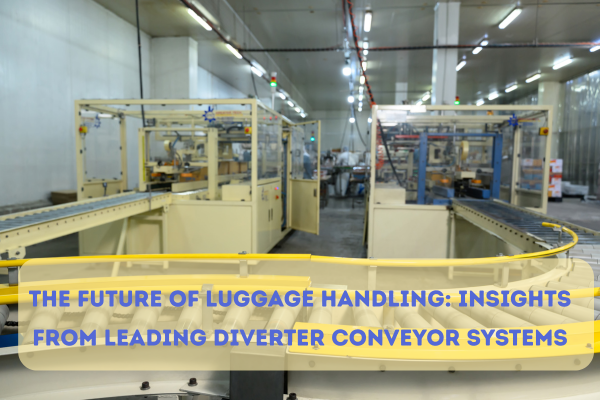
When we discuss the future, it often seems like we are envisioning a world dominated by robotics and AI technology. Well, some of it is true, and these technologies will power most industries in the years to come. The reason is that these technologies will bring about improvements, and the overall output will take a boost. When we apply the same approach to the diverter conveyor system in the baggage sorting process, several questions arise. Is it possible? Yes, definitely, it is possible, and below are the ways it might happen.
AI is making various activities in different industries easier. You can ask it to perform a task at a much lower cost than a laborer. It may be related to analysis or physical operation, depending on the system you use. When you integrate AI technology with a luggage handling system, the computer will do most tasks. You will not have to hire experts to detect flaws in the baggage sorting process. The computer will handle everything because it will have all the necessary features to detect the size, shape, and weight of luggage to sort it accordingly. Then it will also gather data on all the bags that move on the conveyor.
Additionally, the IoT (Internet of Things) will sense and share details about what’s inside the baggage. This technology will help interconnect all the devices from sensors to sorters. There will be multiple operations taking place through IoT technology. This integration will reduce the time and effort required for manual work at airports, railway stations, and other locations.
The number of errors will drop when you automate the baggage handling system. A variety of robotic equipment types are available in the logistics industry that can perform this task. They will sort, move, and pick baggage of different types without any manual help. Simply provide the computer with the information regarding the baggage you wish to sort. Every diverter conveyor system needs help for fast sorting. When you connect robots with it, the number of errors will be reduced. Then, the performance of the baggage handling system will improve to satisfy passengers better. Even the cost of managing these systems will be less than that of manual laborers.
The accuracy level will also increase when you get accurate data. It is about the number of bags passing each minute and the speed of the conveyor. Moreover, deep analytics will include confidential information about the passengers who often travel. The computer will read the tags and share the information about the passenger’s previous records. It will help airlines to offer discounts and gifts to their frequent passengers. It will also help analyze the overall cost of the sorting system. The accuracy level will be high when the right amount of data is available.
Delays in the sorting process or similar operations can cause significant damage to the management's goodwill. Passengers can raise questions and also demand refunds, which can cause problems for the airlines. It will pose a substantial financial and brand image problem for any airline. Since airports use diverter conveyor systems, they will have to face the backlash. However, when baggage is tracked in real-time, there is a lower risk of delays. The data will be available regarding the positioning of every bag in the system. Hence, the airport staff will be aware of the bag's presence, which will save everyone from delays and chaos.
Every industry is switching to sustainable energy to reduce costs and pollution. If we expect a future baggage handling system with sustainable energy, that will not be wrong. When these systems are connected with sustainable energy, the overall cost of operations will drop. Then the revenues of airports will be affected. As the cost of running these machines continues to fall, so will the pollution. The modern baggage handling systems will also be free of excessive components. Their weights might be less than the current ones.
Some of these futuristic features will be available within a few years, while others may take longer. However, most of them are possible and will affect the entire industry. The way operations are conducted will change. The number of errors, operation speed, and cost will be reduced. All these factors will affect the overall passengers’ experience at the airport.